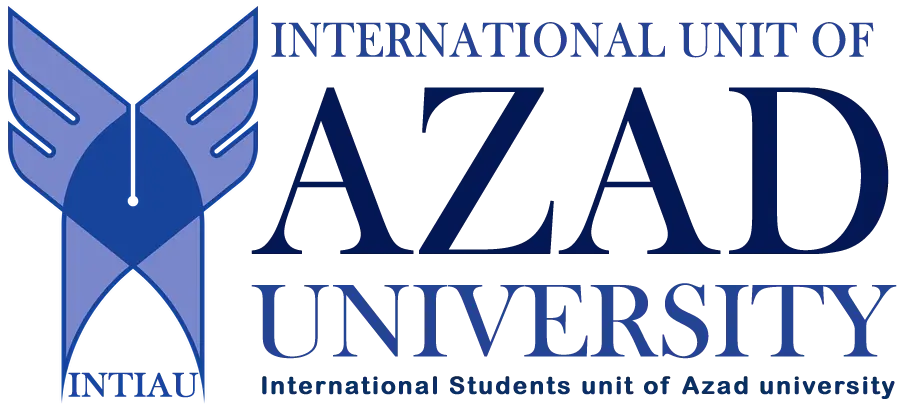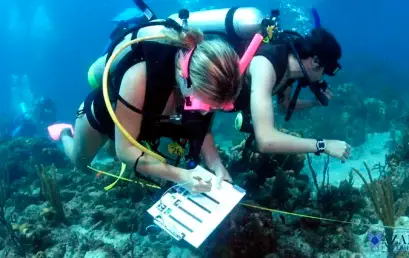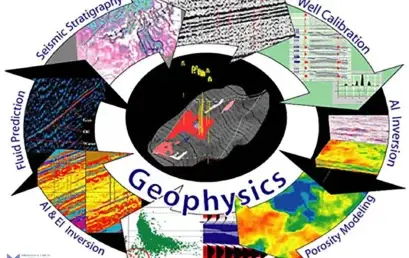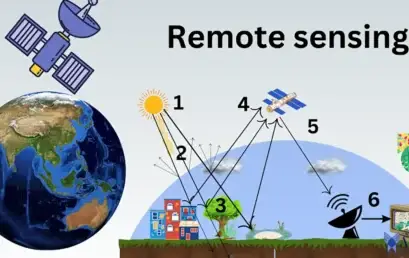Meeresbiologie INTIAU
Meeresbiologie: Ein Überblick
Meeresbiologie ist die Lehre von lebenden Organismen in den Ozeanen und anderen Salzwasserkörpern. Dieses Gebiet der Biologie umfasst ein breites Spektrum an Disziplinen, von der Lehre einzelner Organismen bis hin zur Lehre ganzer Meeresökosysteme.
Meeresbiologen erforschen Fische, Haie, Meeresschildkröten, Wale, Delfine, Korallen und andere Meeresorganismen. Sie erforschen die physikalischen und chemischen Eigenschaften der Meeresumwelt sowie die Wechselwirkungen zwischen Organismen und ihren Lebensräumen. Sie arbeiten auch daran, gefährdete Arten zu schützen und marine Ökosysteme zu erhalten.
Einer der spannendsten Aspekte der Meeresbiologie ist die Entdeckung neuer Arten. Da die Ozeane über 70 % der Erdoberfläche bedecken, gibt es im Bereich der Meeresbiologie noch viel zu entdecken und zu erforschen.
Die Karrieremöglichkeiten in der Meeresbiologie sind vielfältig und spannend. Meeresbiologen können in der Wissenschaft, in Regierungsbehörden, in Naturschutzorganisationen, in der Fischereiindustrie und mehr arbeiten.
Letztendlich hilft uns die Meeresbiologie, das komplexe, vernetzte Netz des Lebens in den Ozeanen zu verstehen und wertzuschätzen sowie die wichtige Rolle, die diese Lebensräume für die Gesundheit unseres Planeten spielen.
Linguistik International Azad University
Linguistik: Die Wissenschaft der Sprache
Sprache ist eines der markantesten Merkmale der Menschheit. Ob durch Sprechen, Schreiben oder sogar Gebärdensprache – wir verwenden Sprache, um miteinander zu kommunizieren, unsere Gedanken und Gefühle auszudrücken und die Welt um uns herum zu verstehen. Aber haben Sie sich jemals gefragt, wie Sprache funktioniert oder wie sie sich im Laufe der Zeit entwickelt hat?
Hier kommt die Linguistik ins Spiel, die wissenschaftliche Untersuchung der Sprache. Die Linguistik ist ein multidisziplinäres Fachgebiet, das Erkenntnisse aus der Psychologie, Anthropologie, Neurowissenschaft, Informatik und anderen Disziplinen nutzt, um die Struktur, Variation und Verwendung der Sprache zu untersuchen.
Linguisten erforschen Themen wie Phonetik (die Lehre von Sprachlauten), Syntax (die Regeln für den Satzbau), Semantik (die Bedeutung von Wörtern und Sätzen) und Diskursanalyse (wie Sprache in einem Kontext verwendet wird).
Einer der faszinierendsten Aspekte der Linguistik ist ihre Fähigkeit, aufzuzeigen, wie sehr wir Sprache in unserem Alltag als selbstverständlich betrachten. Wir denken vielleicht nicht viel über die Grammatik nach, die wir verwenden, oder die Dialekte, die wir sprechen, aber Linguisten können uns zeigen, wie diese Muster unseren sozialen Hintergrund, unsere kulturellen Normen und unsere kognitiven Prozesse widerspiegeln.
Egal, ob Sie Linguistik studieren möchten oder einfach nur neugierig auf die Sprachwissenschaft sind: In diesem lebendigen und sich ständig weiterentwickelnden Bereich kann jeder etwas lernen.
Geophysik
Geophysik ist die Lehre der physikalischen Eigenschaften der Erde, einschließlich ihrer Struktur und Prozesse. Es ist ein wichtiges Studiengebiet, das uns hilft, die Erde und ihre Beziehung zur umgebenden Umwelt besser zu verstehen. Durch den Einsatz verschiedener Techniken wie seismischer Bildgebung, Elektromagnetismus und Schwerkraft können Geophysiker den Untergrund der Erde kartieren und Vorhersagen über Naturgefahren, Ressourcenerkundung und Umweltauswirkungen treffen.
Ein wichtiger Aspekt der Geophysik ist die Untersuchung des Magnetfelds der Erde. Dieses Feld wird vom Erdkern erzeugt und ist für das Funktionieren unseres Planeten von wesentlicher Bedeutung. Geophysiker messen die Intensität und Richtung des Magnetfelds, um Veränderungen im Erdkern und mögliche geomagnetische Stürme, die unsere Stromnetze und Technologien stören können, besser zu verstehen.
Ein weiterer wichtiger Bereich der Geophysik ist die seismische Bildgebung. Mithilfe von Wellen, die durch Erdbeben oder vom Menschen verursachte Quellen erzeugt werden, können Geophysiker detaillierte Bilder der unterirdischen Struktur der Erde erstellen. Diese Bilder können verwendet werden, um Öl- und Gasvorkommen zu lokalisieren, geologische Aktivitäten zu überwachen und sogar verborgene archäologische Strukturen zu entdecken.
Insgesamt trägt die Geophysik entscheidend dazu bei, die Komplexität der physikalischen Eigenschaften der Erde zu verstehen und zu würdigen. Es handelt sich um ein spannendes Forschungsgebiet, das immer wieder neue Erkenntnisse und Entdeckungen hervorbringt.
Zelluläre und Molekularbiologie
Cellular and molecular biology are two fascinating and hugely important areas of scientific research. Together, they explore the fundamental building blocks of life, from the smallest cells to the most intricate biochemical pathways. At the cellular level, researchers investigate how cells function and communicate with one another, while molecular biology focuses on understanding the chemical processes that drive these functions.
One of the most exciting areas of research in cellular and molecular biology is the study of genetics. By decoding the genetic material that controls our traits and characteristics, scientists are unlocking the secrets of how our bodies work and how we can prevent or treat disease. Advances in genetic engineering techniques have also opened up exciting new possibilities for gene therapy and personalized medicine.
But the study of cellular and molecular biology is not just about genetics. Researchers are also exploring the complex biochemical pathways that regulate cellular behavior, studying the role of proteins, enzymes, and other molecules in cellular processes. Understanding these pathways is critical to developing new drugs and therapies for a wide range of diseases, from cancer to Alzheimer’s.
In short, cellular and molecular biology are crucial areas of scientific research that hold the key to unlocking many of the mysteries of life. As our understanding of these fields grows, we are likely to see many exciting breakthroughs in the years ahead.
Arabische Sprache und Literatur
The Arabic language is a beautiful and complex language that has a rich history in literature and poetry. From the early classical poets like Al-Mutanabbi and Al-Arabi to the modern poets like Mahmoud Darwish and Nizar Qabbani, Arabic literature has evolved and prospered throughout the centuries.
The Arabic language and literature have a deep impact on the Arabic culture and society. The language is the language of the Quran and is used in religious rituals, literature, and poetry. Arabic literature spans centuries and is rich with tales of love, war, adventure, and more.
Though Arabic has similarities with other Semitic languages, it stands out for its clarity in grammar and vastness of vocabulary. The Arabic literature has inspired authors and scholars around the world with its depth and beauty.
Learning Arabic language and literature allows for a deeper understanding of the culture and history of the Arab world. It provides an opportunity to engage with the literary works and learn the language in its true context.
In summary, Arabic language and literature contain a fascinating and rich culture and history that continues to be an inspiration to the world.
Pflanzengenetik und Züchtung
Plant genetics and breeding is a fascinating field that has paved the way for significant advancements in agriculture. Through the manipulation of plant genes, scientists and breeders have been able to develop crops that are more resistant to diseases and pests, have increased yields, and are better adapted to their environment.
One of the most important tools in plant breeding is the ability to identify and select for desirable traits, such as drought tolerance or high nutritional content, using molecular markers. This allows breeders to make more precise selections and accelerate the breeding process.
Another exciting development in plant genetics is the use of genome editing technologies, such as CRISPR-Cas9, which allows for precise changes to be made to the plant’s DNA. This technology has immense potential to improve crop productivity and quality.
As our global population continues to grow rapidly, the demand for food will only increase. Plant genetics and breeding offer an essential solution to help sustainably meet these needs and improve global food security.
INTIAU Toxikologie
INTIAU Toxicology is a field of study that delves into the effects of toxic substances on living organisms and the environment. The field encompasses a vast range of topics, including the evaluation of chemicals, environmental toxins, and drug safety.
The impacts of toxic substances are not limited to physical harm within the body, but also extend to economic and social costs attributable to healthcare, environmental damage, and loss of productivity. Toxicology experts play a critical role in identifying the effects of chemicals and the risks to which individuals and communities are exposed.
Toxicology involves various studies of toxic substances through laboratory experiments, clinical trials, and environmental monitoring. It aims to minimize the harmful effects of toxic substances on human health and the environment. Toxicology is a rapidly advancing field, with new methods and techniques being developed to enhance the effectiveness of the evaluation of chemicals.
INTIAU Toxicology is an exciting field, with the potential to change the world for the better. The growing importance of toxicology in today’s society means that it is an excellent choice for aspiring scientists and professionals seeking to make a difference.
Fernerkundung und GIS
Remote Sensing and Geographic Information Systems (GIS) are powerful tools used by a diverse range of professionals. From city planners to ecologists, these technologies allow us to observe and analyze our world with unprecedented accuracy and detail. Remote sensing refers to the acquisition of information about the earth’s surface from sensors on airplanes or satellites. Data acquired this way is then transformed and processed using GIS. GIS allows users to manipulate, visualize, and analyze geographic data, enabling them to make more informed decisions.
The applications of remote sensing and GIS are vast, including land-use planning, natural resource management, disaster response, and environmental monitoring. These technologies have revolutionized the way we gather and analyze data, providing us with a greater understanding of our earth. As we move forward, technological advances in remote sensing sensors and GIS software will only deepen our understanding of earth’s systems and allow for more comprehensive and precise analysis. As a result, remote sensing and GIS will continue to play a crucial role in shaping our world.
INTIAU Kulturpolitik
Cultural policy refers to a government or institutional set of guidelines that promote social, economic, and cultural welfare in a particular society. The objectives of cultural policy are to preserve the country’s cultural heritage, provide support to those who wish to create arts and culture, and to provide access to cultural events and activities. Cultural policy also involves funding of programs that can facilitate cultural diversity and promote peace, tolerance, and understanding.
In today’s modern and global world, cultural policy plays an increasingly vital role in shaping social perspectives and building intercultural connections. A well-planned cultural policy creates long-term growth in the creative industries, stimulates innovation, and attracts quality tourism. Cultural policy can also provide equal opportunities for cultural expression and access to audiences.
The dynamic development of cultural policy can bring enormous benefits to a community. It is the role of both governments and institutions to continue to reflect on and develop cultural policy so that it can remain relevant and effective in contributing to cultural social and economic growth in society.
Azad University Parasitology Course
Ready to take your knowledge of parasites to the next level? Look no further than Azad University’s Parasitology Course! In this course, you’ll gain a comprehensive understanding of parasites, their life cycles, and how they interact with their hosts. You’ll also learn about the impact of parasites on human and animal health, as well as the latest advancements in parasite research. With experienced instructors and hands-on learning opportunities, you’ll be equipped with the skills and knowledge to pursue a career in parasitology or related fields. Don’t let this opportunity pass you by – enroll in Azad University’s Parasitology Course today!










